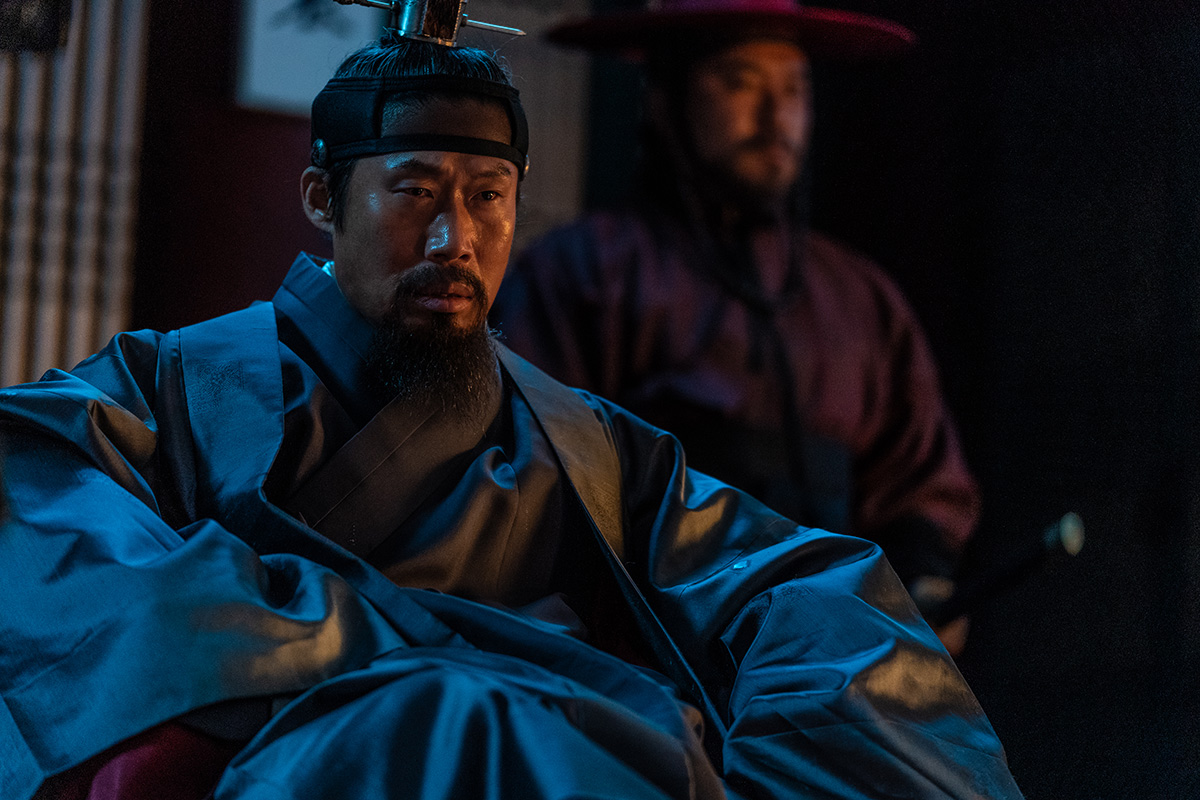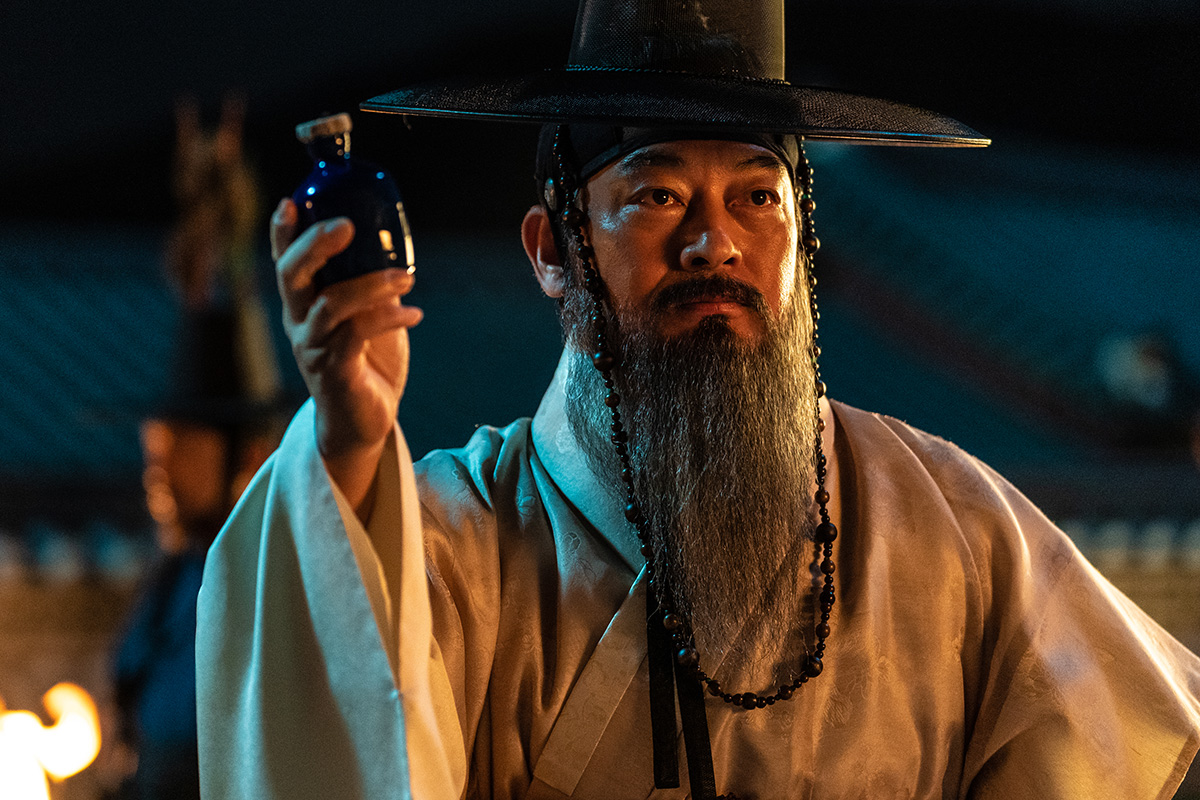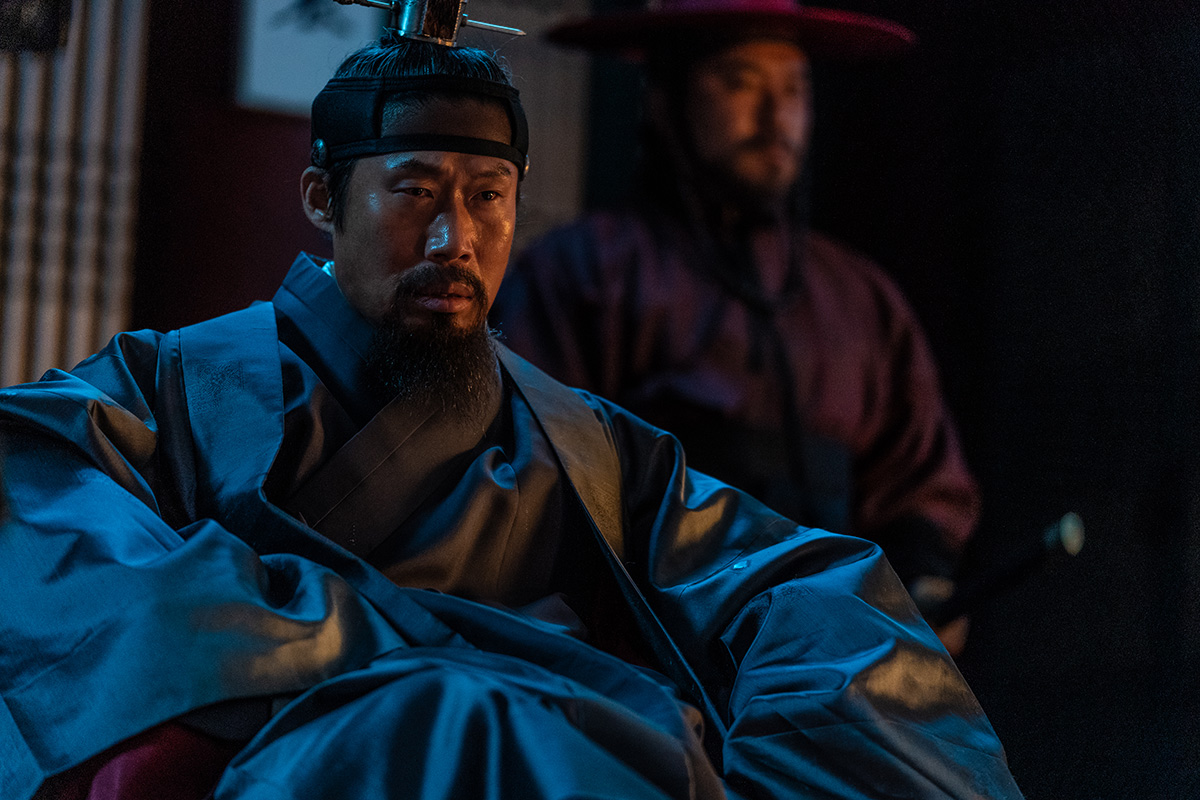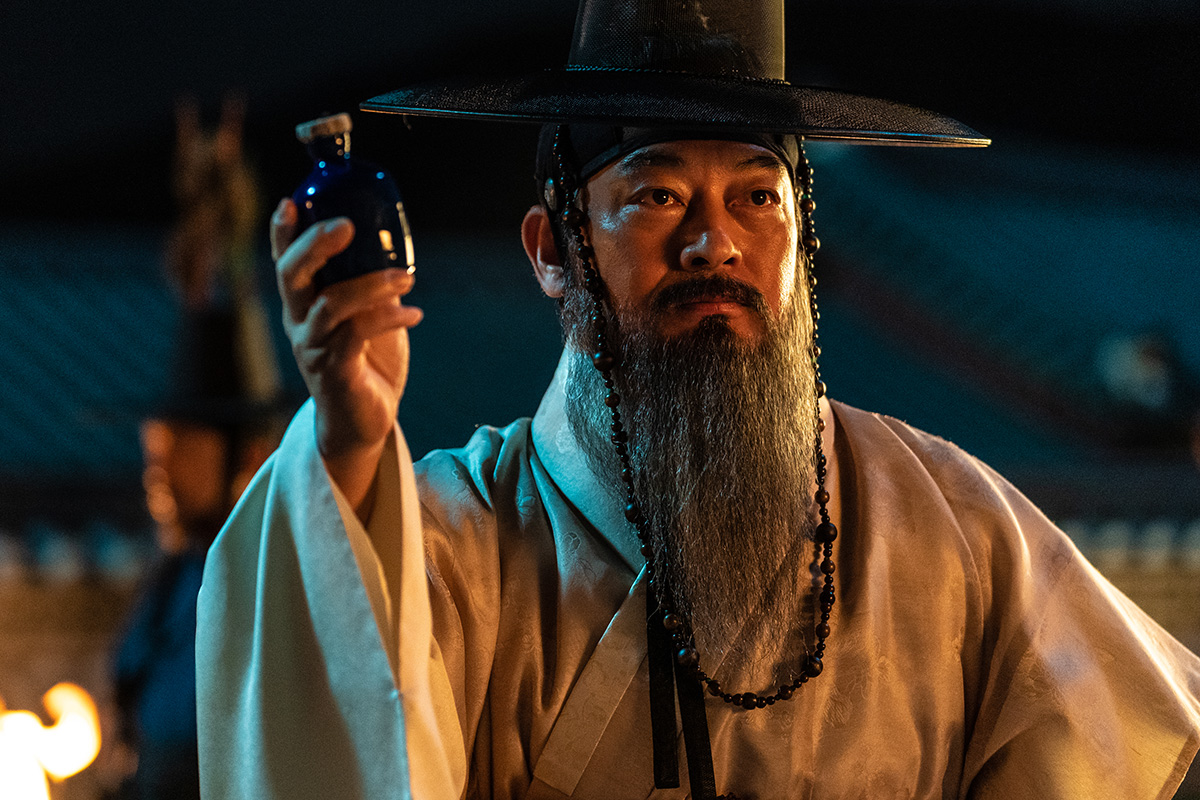영화 <올빼미> 전체는 보는 행위가 지닌 무게에 대한 환유(換喩)이다. 이 작품의 타이틀이 올빼미인 것은 보이는 것과 보이지 않는 것 사이 어둠 속에서 가려진 진실을 응시할 의지가 있는지에 관해 관객에게 묻는다. 올빼미가 낮에 앞을 보지 못하지만 밤에 사물을 정확하게 인지하는 것처럼 영화는 소현세자의 죽음이라는 사건의 어두운 진실을 스릴러 문법으로 풀어냈다.
본다는 것의 의미는 크게 두 가지로 구분해 볼 수 있다. 한자어로 견(見)은 ‘보다’라는 의미를 지니고 있지만 정확히는 눈에 저절로 대상이 비치어 보이는 것이라면, 관(觀)은 어떤 대상을 뚫어지게 바라보는 행위를 뜻한다. 두 글자는 모두 ‘보다’라는 의미를 지니지만 자세히 뜯어보면 그 의미가 사뭇 다르다. 바로 두 글자의 의미는 대상을 향한 바라봄의 행위에 주체의 의지가 담겨 있는지에 따라 구분된다.

영화 <올빼미>는 “들어도 듣지 못했고, 보아도 보지 못한 것처럼 행동해야 한다.” 등과 같은 대사를 통해 궁(宮)에서 살아남기 위한 금기가 반복적으로 언급된다. 이 말은 주체의 의지를 타자에게 들켜서는 안 된다는 의미를 담고 있다. 궁은 지배자인 왕의 의지 이외에 그에 반(反)하는 의지를 들키는 순간 죽임을 당하는 공간이다. 궁은 살아남기 위해 주체가 의지를 잃은 인형처럼 행세하지 않으면 안 된다는 점에서 인간성의 상실을 종용한다.
그런데 영화에 등장하는 이 같은 금기는 단지 궁에서만 통용되는 처세법은 아니다. 보이는 것을 외면하고, 들리는 것에 귀를 닫고 사는 것이 우리의 일상적 처세법이 아닌가. 이런 점에서 영화 <올빼미>에 등장하는 궁이라는 공간은 현실 사회의 알레고리라는 것을 곧 알아차리게 한다. 비록 앞의 금기가 우리 자신의 생명을 보전하고 세상을 편히 살아가는 방법이 될 수 있지만 그 대가로 우리는 인간으로서 지켜야 할 윤리를 포기할 수밖에 없다.
이쯤에서 도덕과 윤리는 구분되어야 한다. 도덕은 사회가 정한 제도적 규범적 틀을 어기지 않고 지키며 살아가고자 하는 관념이라면, 윤리란 사회가 정한 도덕 규범을 넘어 자신의 신념을 현실적으로 실현하기 위해 기꺼이 죽음 속에 자신을 기투(企投)하는 의지이다. 예컨대 그리스 비극 <안티고네>에서 주인공 안티고네가 테베의 왕 크레온의 명령을 거부하고, 길바닥에 버려진 자기 오라버니의 시체를 수습해 무덤에 안장한 후 죽음이라는 처벌을 받아들이는 행위에서 나타나는 숭고한 태도가 하나의 예이다.

이처럼 인간성의 숭고함은 사회가 정한 도덕 규범을 무조건 지키는 데에서 발생하는 것이 아니라 바로 자기 자신의 신념을 외부로 실현함으로써, 그 사회의 도덕 규범과 제도의 모순을 드러내는 윤리적 태도에서 발생한다. 바로 그렇기에 진실의 무게는 가볍지 않다. 진실 그 자체는 아무런 힘이 없으나, 그것이 우리의 저항적 행위를 정당화해주고, 죽음 속에 자신의 실존마저 걸 수 있는 윤리적 인간이 되도록 이끌어주기 때문이다.
영화 <올빼미>에서 맹인 침술사 경수가 소현세자의 죽음을 목격하고, 독살의 배후가 소현세자의 아버지 인조였다는 사실을 알게 되었을 때, 그에게 실존적 결단의 순간이 도래한다. 과연 진실을 알고도 모르는 척 외면하고 속물로 살아갈 것인가, 아니면 소현세자를 독살한 배후가 인조였다는 사실을 밝히고 그 대가로 왕에게 죽임을 당할 것인가. 두 가지 갈림길에서 경수는 자신의 윤리를 포기하지 않고 신념과 대의를 위해 자신을 죽음 속에 던져 넣는다.
그럼 경수가 지키고자 했던 진실은 패배한 것일까? 이 작품이 더 현실적이라면 경수의 목이 베여 형장의 이슬로 사라지겠지만 영화는 반전을 모색한다. 경수는 우여곡절 끝에 죽음의 위기에서 살아남고 인조의 병마가 깊어질 때쯤 그는 침술사로 초빙되어 궁으로 돌아온다. 그리고 죽어가는 인조의 사혈(死血)에 망설이지 않고 시침한다. 이때 경수는 촛불을 끄고 죽어가는 인조를 뚫어져라 바라보며 묻는다. “무엇이 보이십니까?”
스크린에는 아웃포커싱(Out-Focusing)된 화면이 보이고 인조의 시선은 초점을 잃고 서서히 닫힌다. 이 같은 이미지는 인조가 추구한 욕망의 무의미함을 뜻하면서도 그의 손에 죽어간 망자들의 시선이기도 하다. 바로 인조의 시선을 통해 죽은 망자(亡者)들이 되돌아온다. 억압된 진실은 사라지지 않고 유령의 시선으로 되돌아와 부정한 사회를 처벌하는 것이다.
<사진제공 - NEW>
Weight of Truth - Ahn Tae-jin's Film “The Night Owl” (2022)
“The Night Owl” is a metonymy for the weight of the act of seeing. The question posed by the title is whether or not the audience will have the courage to gaze into the truth that lies in the shadows between the seen and the unseen. Just as an owl perceives things accurately at night, the film unravels the dark truth behind the death of Crown Prince Sohyeon in a thriller style.
The meaning of seeing can be divided into two main categories. In Chinese, “Gyeon (見)” means “to see,” but to see precisely, where the object is reflected in one’s eyes; “Gwan (觀)” refers to the act of looking at a certain object piercingly. Both terms mean “to see,” but if we examine them closely, the meaning of "to see" is distinct in each term. Whether the subject's volition is present in the act of looking at an object determines how the two terms are to be interpreted.

In “The Night Owl,” it is repeatedly emphasized that “You must act as if you have heard but have not heard, and have seen but have not seen.” This is how to avoid one of the taboos which shouldn't behave in the palace: the will of the subject should not be discovered by others. The palace is a place where people are killed the moment they go against the will of the ruler—the king. Humanity is lost in the palace as subjects are forced to act like puppets with no will of their own in order to survive.
This theme is not solely applicable to the past; it is also applicable to the modern age where people turn away from what they see and close their ears to what they hear. Thus, the space of the palace in the film “The Night Owl” is a metaphor for modern society. Although ignorance can be a way to preserve our own lives and exist comfortably in the world, to remain in ignorance, we have no choice but to give up our ethics as human beings.
At this point, morality and ethics must be distinguished. If morality is the idea of living without violating the institutional normative framework established by society, ethics is the willingness to risk oneself in the face of death in order to realize one's beliefs beyond the moral norms established by society. For example, in the Greek tragedy, “Antigone,” the heroine, Antigone, refuses the order of Creon, King of Thebes, collects the body of her brother that has been abandoned in the street, places it in a tomb, and accepts capital punishment with a noble attitude.

Thus, the sublimity of humanity does not arise from unconditionally keeping the moral norms established by society but from an ethical attitude that exposes the contradictions between moral norms and societal institutions by realizing one's own beliefs externally. Because of this, the truth carries a heavy burden. Although the truth itself is powerless, it enables us to overcome obstacles and helps us develop into moral individuals who are willing to risk their lives for others.
In “The Night Owl”, the blind acupuncturist, Kyung-soo, faces an existential choice when he finds that King Injo, the deceased crown prince’s father, was responsible for his death. Will he live in ignorance even though he is aware of the truth? Or will he confess King Injo’s involvement in Crown Prince Sohyeon’s poisoning and receive capital punishment by the king’s order in retaliation? At this fork in the road, Kyung-soo chooses to follow his moral principles and risks his life to advance his cause.
So, was the truth that Kyung-soo attempted to protect defeated? In a more realistic movie, he would have been beheaded and vanished into the morning dew of the execution site, but this film entails a surprise. After many twists and turns, Kyung-soo escapes with his life, and when King Injo's illness worsens, he is summoned to return to the palace as a famous acupuncturist. He then punctures King Injo at a fatal point without any hesitation, killing him. As the king lies dying, Kyung-soo asks, “What do you see?” while extinguishing the candles and gazing into his eyes.
The shot gradually loses focus on the gaze of King Injo. Such an image signifies the futility of the desire pursued by King Injo and the gaze of the dead who died at his hands. It is through the eyes of King Injo that the dead return. The suppressed truth does not disappear and returns to the ghost's gaze to punish the unjust society.
<Photographs by - NEW>













